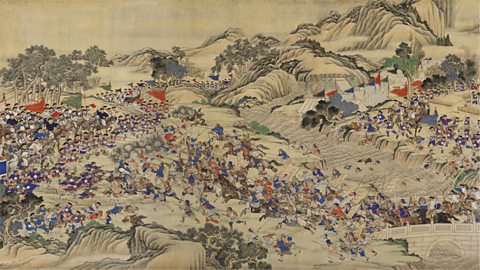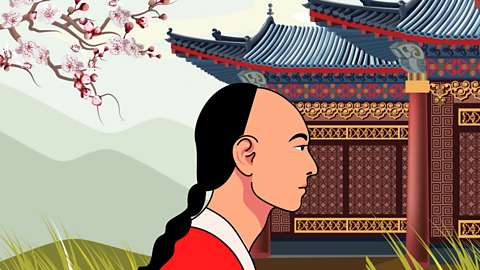Key points
- In the early 1800s, the Qing dynasty was starting to struggle. Population growth meant there wasn’t enough farmland or jobs to support everyone. Poverty led many to rebel against the Qing.
- Foreign powers were also starting to involve themselves in trade with China, which led to wars and treaties that harmed the Qing.
- By the late 1800s, many in China recognised that the Qing needed to change.
- Before learning about the fall of the Qing dynasty, it might be helpful to read this guide on the rise of the dynasty and this guide on its expansion.
Challenges
By the early 1800s, there were signs that the Qing empire was beginning to struggle to maintain power and control. The population had doubled since 1700, there was not enough farmland or jobs, and not enough officialAn official is a person who works for the government. In the Qing, these were mostly men who had passed the Confucian exams and then been appointed to govern local areas – dealing with legal cases, managing town and countryside, and handling the local gods as well. to manage the people. The empire was huge and expensive. And now there were Western powers who sought to develop control in the area too.
The Qing dynasty lasted over 250 years. China had been ruled by emperors from other dynasties for over two thousand years. Why did this system suddenly collapse in 1911?
This is one of the big questions in Chinese history. Was it the arrival of the Western powers? Was it problems inside China? Historians still can’t decide. What do you think?
Shopping in Qing China
Qing-era Chinese cities were big, bustling places, where you could buy almost anything. China’s luxury goods – tea, silk, china – were the envy of the world. But many people in China could not read, and in the late Qing period, many Europeans were starting to arrive who couldn’t read the language either.
To solve this, shops in China had picture signs to tell people what they sold.
Activity - Match the shop signs
The role of British merchants
During the 1700s, trade with Europe rapidly increased. The Europeans wanted the tea and silk made in China, but there was nothing they could trade that China wanted. Instead, they had to pay in silver. To keep control of trade and the foreigners arriving, the Qing government only let European traders land at the port of Guangzhou (Canton), and Europeans could only trade with one group of Chinese merchants who were managed by the government.
Some British merchants were frustrated at the lack of access to wider trade and concerned about the amount of silver they were paying into China. In the 1700s they began to sell opiumA drug made from poppy flowers. It is highly addictive and very dangerous. , which China did not produce themselves. These merchants bought opium in India from farmers under the control of the British East India Company. They then exchanged it in China for tea and silk to sell in Britain. This was known as the triangular trade in opium.
Selling opium in China was banned, but British merchants smuggled it into China in huge quantities, earning vast amounts of money. Meanwhile, addiction to opium in China was ruining lives and communities.
In 1839, the Qing government confiscated and burned 20,000 tonnes of opium in an attempt to enforce the ban. With tensions rising, British merchants persuaded the British government to send the navy to attack Chinese ports, in the name of defending trade.
War and treaties
The First Opium War lasted from 1839 to 1842. The British Royal Navy had much better guns and easily defeated the Qing armies. In the aftermath, the Treaty of Nanking was signed.
The Treaty of Nanking required the Qing to:
- pay compensation to the British for the opium that was destroyed
- open more ports to foreign trade
- give Britain the island of Hong Kong
- make British people exempt from Qing law
This was the first of the Unequal Treaties. Other military defeats followed, and the Qing were forced to sign more treaties with other countries. They are called the Unequal Treaties because they were only beneficial to one side. They forced the Qing to do things like give up land, pay money, and allow foreigners to travel as they pleased. All of the treaties were very damaging to the Qing.
The opening of China allowed foreigners to travel through the country, including Christian missionariesPeople who travel to spread their religion to new people.. Although missionaries never succeeded in converting that many people, they were still influential through the schools and hospitals they founded, and through the translation of Christianity into Chinese. The treaty portsPorts that were opened to foreigners to settle in and trade through the Unequal Treaties. Guangzhou (Canton) and Shanghai were the most famous treaty port cities. developed into new cities, including Shanghai and Hong Kong. These cities had very diverse populations and cultures, bringing new ideas, new entertainment, and new fashions into China.
The Civil War period
The Taiping Rebellion (1850 - 1864) is another example of the things that were going wrong for the Qing. The Taiping Rebellion was a religious movement and rebellion that devastated southern China. ‘Taiping’ is also often used to refer to the followers of the movement.
The leader of the uprising, Hong Xiuquan, was a man from the south of China who had failed the exams to become an official. After suffering a nervous breakdown, Hong became convinced he was the younger brother of Jesus Christ and that it was his mission to rid China of demons and of the Manchu Qing. He started a religious movement that swiftly became a rebellion. Hong’s state called itself the Taiping Tianguo, or in English, the Heavenly Kingdom of Great Peace.
Hong’s call to rebellion was attractive to many poor people in China. Taxes had gone up, and natural disasters such as floods and hurricanes left many desperate. The Qing armies were weak and ineffective. By 1853, the Taiping ruled much of southern China.
The Qing eventually defeated the Taiping, largely due to the local gentryIn Qing China, these would be the families of officials and those well-off enough to send their sons to study for the exams. in the areas the Taiping occupied. These men stayed loyal and raised their own armies to fight against Hong Xiuquan.
The Qing won, but the Taiping Rebellion was incredibly destructive. It killed millions of people on both sides of the rebellion and left much of southern China in ruins.
The Taiping was not the only rebellion the Qing faced at the time. There were major uprisings all across China and millions more died. The years 1850 - 1878 are called the Civil War period. Historians now recognise how resilientAble to withstand and recover quickly from difficulty. the Qing were to survive these years at all.

End of an empire
By the late 1800s, the Qing dynastyA series of rulers who are all from the same family. was under threat. Newspapers, both in China and abroad, were talking about whether Britain, Germany, France and the USA would divide China between them and make it part of their empires. Attitudes to the Qing in Europe had changed. Once seen as a desirable, rich land, China was now seen as weak and suffering.
People in China knew the Qing dynasty was under threat too. The Civil War period had done much harm and China’s defeat by Japan in the Sino-Japanese War of 1895 was a further shock. To China, Japan had always been its smaller neighbour. Japan had recently reformed its government and had promoted Western technology and science. Thinkers in China took the defeat as proof that China also needed to change.
reformerA person who works to bring change, hoping to improve something gradually. inside the Qing government worked to try to save the Qing by modernising the military and building factories, railways, and telegraphA method of communication where messages are sent and received from far away. Electricity is used to send coded messages through wires.. Following the disaster of the Boxer RebellionA violent anti-Christian and anti-foreign rebellion, 1899-1901. The Qing court chose to support the Boxer rebels, but a force of eight foreign powers defeated the rebels and the Qing. The result was humiliation for the Qing, and they were forced to pay vast sums of money to the victorious powers., the Qing court introduced the New PoliciesThe New Policies, 1901-1911, were a series of major reforms in the hope of saving the Qing Dynasty. After the Boxer Rebellion, the Qing court realised the dynasty had to become more modern. Reforms included education, the military and a new legal system. in 1901, designed to bring further change. The old ConfucianismConfucianism is a philosophy that demands good behaviour and loyalty to family and emperor. It is based on the teachings of the Chinese philosopher Confucius (551-479 BC), and was at the core of the belief and education systems of most Chinese dynasties. examinations were abandoned in favour of western-style education. Other reforms tackled tax, law, the police, and the military.
However, there were also people who thought the Qing reformers were not doing enough. Some revolutionaries argued that China could not stand up to the West without getting rid of the emperors entirely, and some felt it was wrong for Han Chinese to be ruled by a Manchu emperor.
The Xinhai Revolution came very suddenly in 1911. Soldiers in Wuchang revolted and other cities quickly joined them. The revolutionaries declared the founding of the Republic of China. Puyi, the last emperor of China, stood down and the Qing was over.
Test your knowledge
Play the History Detectives game! gamePlay the History Detectives game!
Analyse and evaluate evidence to uncover some of history’s burning questions in this game.

More on The Qing dynasty (1644-1911)
Find out more by working through a topic
- count1 of 3

- count2 of 3
